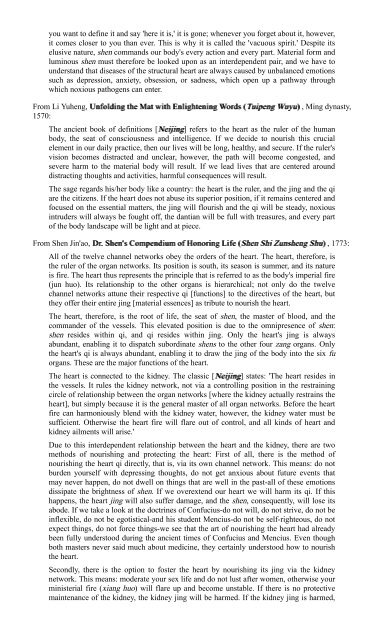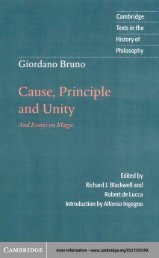Create successful ePaper yourself
Turn your PDF publications into a flip-book with our unique Google optimized e-Paper software.
you want to define it and say 'here it is,' it is gone; whenever you forget about it, however,<br />
it comes closer to you than ever. This is why it is called the 'vacuous spirit.' Despite its<br />
elusive nature, shen commands our body's every action and every part. Material form and<br />
luminous shen must therefore be looked upon as an interdependent pair, and we have to<br />
understand that diseases of the structural heart are always caused by unbalanced emotions<br />
such as depression, anxiety, obsession, or sadness, which open up a pathway through<br />
which noxious pathogens can enter.<br />
From Li Yuheng, Unfolding the Mat with Enlightening Words (Tuipeng Wuyu) , Ming dynasty,<br />
1570:<br />
The ancient book of definitions [Neijing] refers to the heart as the ruler of the human<br />
body, the seat of consciousness and intelligence. If we decide to nourish this crucial<br />
element in our daily practice, then our lives will be long, healthy, and secure. If the ruler's<br />
vision becomes distracted and unclear, however, the path will become congested, and<br />
severe harm to the material body will result. If we lead lives that are centered around<br />
distracting thoughts and activities, harmful consequences will result.<br />
The sage regards his/her body like a country: the heart is the ruler, and the jing and the qi<br />
are the citizens. If the heart does not abuse its superior position, if it remains centered and<br />
focused on the essential matters, the jing will flourish and the qi will be steady, noxious<br />
intruders will always be fought off, the dantian will be full with treasures, and every part<br />
of the body landscape will be light and at piece.<br />
From Shen Jin'ao, Dr. Shen''s Compendium of Honoring Life (Shen Shi Zunsheng Shu) , 1773:<br />
All of the twelve channel networks obey the orders of the heart. The heart, therefore, is<br />
the ruler of the organ networks. Its position is south, its season is summer, and its nature<br />
is fire. The heart thus represents the principle that is referred to as the body's imperial fire<br />
(jun huo). Its relationship to the other organs is hierarchical; not only do the twelve<br />
channel networks attune their respective qi [functions] to the directives of the heart, but<br />
they offer their entire jing [material essences] as tribute to nourish the heart.<br />
The heart, therefore, is the root of life, the seat of shen, the master of blood, and the<br />
commander of the vessels. This elevated position is due to the omnipresence of shen:<br />
shen resides within qi, and qi resides within jing. Only the heart's jing is always<br />
abundant, enabling it to dispatch subordinate shens to the other four zang organs. Only<br />
the heart's qi is always abundant, enabling it to draw the jing of the body into the six fu<br />
organs. These are the major functions of the heart.<br />
The heart is connected to the kidney. The classic [Neijing] states: 'The heart resides in<br />
the vessels. It rules the kidney network, not via a controlling position in the restraining<br />
circle of relationship between the organ networks [where the kidney actually restrains the<br />
heart], but simply because it is the general master of all organ networks. Before the heart<br />
fire can harmoniously blend with the kidney water, however, the kidney water must be<br />
sufficient. Otherwise the heart fire will flare out of control, and all kinds of heart and<br />
kidney ailments will arise.'<br />
Due to this interdependent relationship between the heart and the kidney, there are two<br />
methods of nourishing and protecting the heart: First of all, there is the method of<br />
nourishing the heart qi directly, that is, via its own channel network. This means: do not<br />
burden yourself with depressing thoughts, do not get anxious about future events that<br />
may never happen, do not dwell on things that are well in the past-all of these emotions<br />
dissipate the brightness of shen. If we overextend our heart we will harm its qi. If this<br />
happens, the heart jing will also suffer damage, and the shen, consequently, will lose its<br />
abode. If we take a look at the doctrines of Confucius-do not will, do not strive, do not be<br />
inflexible, do not be egotistical-and his student Mencius-do not be self-righteous, do not<br />
expect things, do not force things-we see that the art of nourishing the heart had already<br />
been fully understood during the ancient times of Confucius and Mencius. Even though<br />
both masters never said much about medicine, they certainly understood how to nourish<br />
the heart.<br />
Secondly, there is the option to foster the heart by nourishing its jing via the kidney<br />
network. This means: moderate your sex life and do not lust after women, otherwise your<br />
ministerial fire (xiang huo) will flare up and become unstable. If there is no protective<br />
maintenance of the kidney, the kidney jing will be harmed. If the kidney jing is harmed,

















